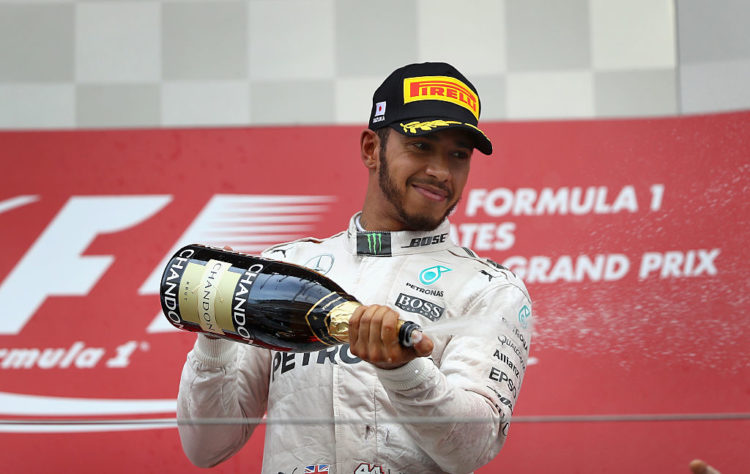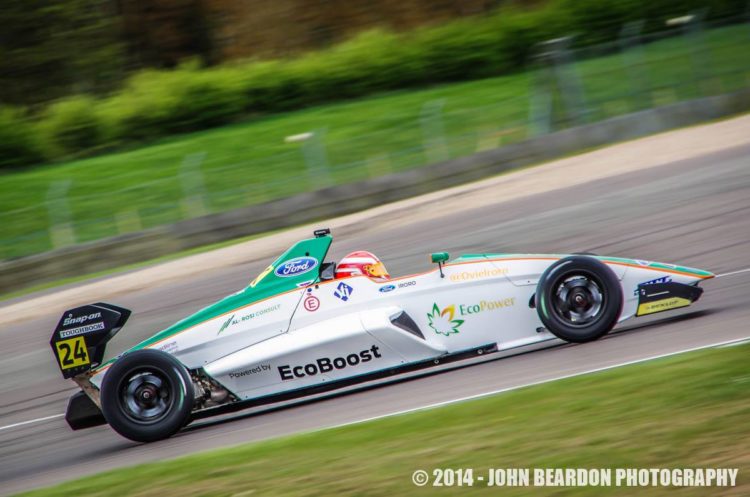Formula One and motor sports in general have been dominated by white people for a long time. Lewis Hamilton is an exception. The 2016 Rio games showed that race doesn’t matter, whatever the sport. So who should we be looking out for?
Ovie Iroro is the first Nigerian motor racing driver to compete in both the Formula Renault and Formula Ford Championship. He tells us more about what it takes to compete in motor sports.
How did you get into motor sports and what was it about driving that caught your interest?
As young as I can remember I have always wanted to drive. But my love for motor sports began when I watched an edition of the 24-hour Le Mans. I also took part in my first ever Go-Karting championship in Lagos and won. It was then I thought, wow, I could take this seriously.
Sponsorship is one of the keys to getting a driving seat.
What was your experience in Formula Renault like and what challenges did you face?
I moved to the UK about six years ago for school and approached a few teams and told them I wanted to race and they gave me an outline of what is required. Sponsorship is one of the keys to getting a driving seat, so I needed to get funds. Once that was secured, I had to get through the licensing tests and training days before the team could sign me on.
Funding still remains a big challenge to compete in motor sports, even at the lower levels. You have track fees, tyres and fuel which have to be paid for by the driver. The path is different however, if you are one of the lucky ones to be discovered by teams such as McLaren, or if you come from a family with a track record in motor sports.
So does that mean that talent takes a back seat during the early years?
Even the most talented prospects need to secure funding because without it, there is not much they can do. It’s just that brutal.
It’s pretty much a level playing field. As long as you are fast, then you are fast.
There are not many known ethnic minorities within motor sports. Did you ever face any difficulty because of your background?
To be honest my background was never an issue at any point. It’s pretty much a level playing field. As long as you are fast, then you are fast. No one can really argue about the results. When you are in the car, everybody is pretty much the same.
Is it then fair to say that that the lack of ethnic minorities in the motor sports is down to how expensive it is to compete?
It is one factor, yes. But another factor is that ethnic minorities do not really have anyone to look up to within motor sports who could inspire them to pursue a career within the sport.

In your case, growing up, which driver did you look up to that inspired you. Did you model your driving style on theirs?
When I was growing up, the most popular driver was Michael Schumacher and in more recent times, Lewis Hamilton. I would say those two drivers have had the biggest influence on me.
Tell us about the Formula Ford experience.
For me, this was a step in the right direction after Formula Renault because many drivers have used Formula Ford as a springboard to Formula One. The Championship itself is also the biggest one in the UK because its screened live on TV and has a big following.
There were 10 racing weekends in the year, with the first race taking place at Easter. Thereafter, the races took place at three week intervals.
What was your most memorable experience from participating in the Championship?
Finishing consistently in good positions was a big achievement. I was racing against guys who had more experience in the championship and knew the tracks very well. I, on the other hand, had a small budget due to funding constraints and could not spend as much time training and practising with the car. A day of training can cost upwards of £2,000.
A race in Africa is a step out into the unknown for the organisers.
In your opinion, what is currently preventing Formula One from having a race in Africa?
I think it comes down to the perceived risk. A race in Africa is a step out into the unknown for the organisers. The idea is not a new one, but it’s merely been talked about, without anything concrete being done. This is one of the reasons I am working to bring a GT Series street race to Lagos.
Tells us more about this idea
The idea came about on the back of a similar event which has occurred in Malaysia for a couple of years. The organisers of the event succeeded in creating thousands of jobs and also generating revenue from ticket sales and tourism, with a big impact on the local economy. The GT series comes under FIA category 2 races, which if we are able to make it a success would be a forerunner to applying to bring Formula One to the country later in the future. That is exactly what Azerbaijan did when they successfully hosted a Formula One race in Baku earlier this year.
What are your interests outside of motor sports?
I do a lot of cycling. It initially started as a way to keep fit but I have taken it quite seriously now.
https://www.instagram.com/p/BG4b_fHMMiM/?taken-by=ovieiroro
How do you relax at weekends and when you travel, what’s that one item that goes in before anything else?
At the weekend, I usually spend one morning cycling. I go out with the cycling club for a few hours, sometimes we cycle to another city. Holiday wise, I can not leave without my laptop (laughs). There are so many things I have to stay on top of, so having my laptop is super important. Unfortunately I don’t have the luxury of completely switching off.
Check out more on Ovie here.

